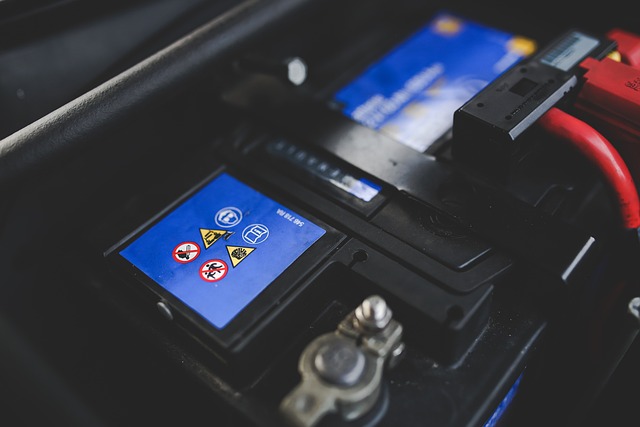Auxiliary batteries are essential components for maintaining a stable and reliable power supply in off-grid settings, storing excess energy from renewable sources like solar panels or wind turbines. They compensate for the intermittent nature of these energy sources by buffering power during production highs and releasing it when needed, thus providing a consistent energy flow. Auxiliary batteries are designed to handle numerous charge and discharge cycles without significant performance loss, and they have become more cost-effective and lightweight, making them suitable for a variety of applications from residential to commercial use. These batteries enhance energy independence and sustainability, being increasingly important in the transition towards cleaner energy solutions. They also ensure functionality during periods when primary sources are weak or unavailable, mitigating risks associated with voltage irregularities and power disruptions. When selecting an auxiliary battery, consider factors like capacity, performance, and technology type (such as AGM or lithium-ion) to match your energy needs and optimize system efficiency. Regular maintenance, including monitoring of charge levels, temperature control, and adherence to manufacturer guidelines, is key to prolonging the life and reliability of the battery, ensuring its effectiveness in off-grid environments.
Exploring the integration of auxiliary batteries in off-grid systems presents a compelling narrative on the advancement of sustainable energy practices. This article delves into the multifaceted benefits of employing auxiliary batteries as a complementary power solution, ensuring consistent and reliable energy supply, and enhancing overall system efficiency. We will navigate through the role these batteries play in energy storage, their function as redundancy solutions for critical applications, and the environmental advantages they offer in the pursuit of sustainable living. Additionally, we will guide readers on selecting and maintaining the optimal auxiliary battery to meet their off-grid needs, ensuring a well-informed approach to energy independence.
- Understanding Auxiliary Batteries in Off-Grid Systems
- Reliability of Power Supply with Auxiliary Batteries
- Enhanced Energy Storage Capabilities for Consistent Power
- Redundancy and Backup Solutions for Critical Applications
- The Role of Auxiliary Batteries in Energy Efficiency
- Uninterrupted Power Supply (UPS) and Its Importance Off-Grid
- The Environmental Impact of Auxiliary Batteries in Sustainable Living
- Selecting and Maintaining the Right Auxiliary Battery for Your Off-Grid Needs
Understanding Auxiliary Batteries in Off-Grid Systems

Auxiliary batteries play a pivotal role in off-grid systems, serving as a dependable energy reserve that complements primary power sources like solar panels or wind turbines. In an off-grid setup, these batteries are the silent sentinels of stability and reliability, storing excess energy harvested during peak production times and releasing it when the main power sources falter or when demand outstrips supply. The integration of auxiliary batteries ensures a consistent power flow, effectively smoothing out the natural fluctuations in renewable energy generation, which can be intermittent due to weather conditions or time of day.
The benefits of auxiliary batteries are manifold. They allow for the storage of clean, renewable energy in usable forms, making it available on demand and enhancing the overall efficiency of the off-grid system. This not only maximizes the use of sustainable resources but also diminishes the reliance on fossil fuels. Auxiliary batteries are designed to handle deep discharge cycles and have a long lifespan, which means they can be counted upon for years to come. Moreover, with advancements in battery technology, these auxiliary power storage solutions continue to become more cost-effective and lighter, facilitating their integration into an array of off-grid applications, from remote cabins to telecommunication towers, thereby underscoring their significance in the pursuit of energy independence and sustainability.
Reliability of Power Supply with Auxiliary Batteries

When relying on solar or wind power systems for off-grid living, auxiliary batteries play a pivotal role in maintaining a consistent and reliable power supply. These batteries act as a reservoir, storing excess energy generated during peak production times and releasing it during periods of low generation or high demand. This storage capacity is crucial for ensuring that households and businesses have access to electricity whenever needed, which eliminates the unpredictability associated with solely relying on real-time energy generation. Auxiliary batteries are designed to handle multiple charge and discharge cycles without significant degradation, making them a dependable complement to renewable energy sources.
Moreover, the reliability of auxiliary batteries is underscored by their ability to function during cloudy or calm periods when the primary energy source might be less productive. This unwavering performance is not only beneficial for daily operations but also critical in emergency situations where power is a necessity, such as during natural disasters or grid outages. The redundancy provided by auxiliary batteries, combined with their long lifespan and ability to be interconnected for increased capacity, makes them an indispensable component of any off-grid energy system. Their contribution to energy independence and security is a testament to the advancements in battery technology, which continue to enhance the feasibility and sustainability of living off the grid.
Enhanced Energy Storage Capabilities for Consistent Power

Auxiliary batteries play a pivotal role in expanding the energy storage capabilities for those relying on off-grid power solutions. These supplementary power sources are designed to work alongside primary batteries or solar panels, providing a consistent and reliable power supply that can handle fluctuating energy demands. With the ability to store surplus energy generated during peak production times, auxiliary batteries ensure a steady flow of electricity, even during periods of low sunlight or at night. This not only enhances the overall energy autonomy but also diminishes the likelihood of power outages due to depleted storage. The integration of auxiliary batteries in off-grid systems allows for the optimization of solar energy usage, leading to a more sustainable and self-sufficient lifestyle with minimal reliance on traditional grid networks. Users can confidently rely on this additional energy reserve for critical applications, from running household appliances to powering essential electronic devices, thereby ensuring a smooth and continuous power experience.
Redundancy and Backup Solutions for Critical Applications

Auxiliary batteries serve as a critical component in off-grid systems, offering redundancy and reliable backup solutions for critical applications. These power sources ensure that essential devices and systems continue to operate even when primary energy sources falter or fail. For instance, in scenarios where solar panels or wind turbines are the main energy suppliers, an auxiliary battery system can store excess energy generated during peak production times. This stored energy becomes invaluable during periods of low sunlight or calm winds, maintaining the availability and functionality of vital systems such as medical equipment, security systems, communication devices, and refrigeration units for preserving perishable goods.
The benefits of auxiliary batteries extend beyond mere backup; they are integral to the resilience and reliability of off-grid setups. Their capacity to hold charge over extended periods allows users to tap into a steady power supply without immediate recourse to alternative energy sources or external power grids. This autonomy is particularly advantageous in remote locations where traditional infrastructure is either unavailable or unreliable. Auxiliary batteries, therefore, are not just an afterthought but a fundamental element that enhances the efficiency and sustainability of off-grid living, ensuring that critical applications maintain their functionality regardless of external energy supply fluctuations.
The Role of Auxiliary Batteries in Energy Efficiency

Auxiliary batteries play a pivotal role in enhancing energy efficiency within off-grid systems, acting as a critical component for sustainable energy management. These batteries are designed to store excess energy generated from renewable sources like solar panels or wind turbines during peak production times. By doing so, they ensure a consistent supply of electricity, even when the primary energy source is not actively producing power. This stored energy can be particularly valuable during periods of low sunlight or calm winds, maintaining a reliable power flow without relying on non-renewable energy sources. The ability to buffer and ration this energy significantly reduces waste and optimizes the overall efficiency of the off-grid system. Additionally, auxiliary batteries can be sized to match the energy consumption patterns of a household or application, further enhancing their role in tailoring energy use to actual needs. This customization not only improves energy efficiency but also contributes to cost savings over time by reducing the necessity for additional power generation equipment and lowering the environmental impact associated with traditional grid-based electricity solutions. With advancements in battery technology and increasing capacity at a decreasing cost, auxiliary batteries are becoming an increasingly attractive solution for those looking to maximize energy efficiency in off-grid scenarios.
Uninterrupted Power Supply (UPS) and Its Importance Off-Grid

Auxiliary batteries play a pivotal role in maintaining an uninterrupted power supply (UPS) off-grid, ensuring that essential systems and devices continue to operate even when primary power sources falter or fail. In remote or off-grid locations, reliance on a single power source, such as solar panels or wind turbines, can be risky; these sources are subject to fluctuations in availability due to weather conditions or time of day. Auxiliary batteries serve as a buffer, storing excess energy generated during peak production times and releasing it when the primary power sources are insufficient. This UPS function is critical for protecting sensitive electronics from voltage spikes or dips that can occur with intermittent renewable energy sources. The absence of a reliable UPS system off-grid can lead to data loss, equipment damage, and disruption of critical operations, making the role of auxiliary batteries indispensable in maintaining a stable and consistent power output for both residential and commercial applications. Furthermore, the use of high-quality auxiliary batteries with advanced energy storage technologies can significantly extend the operational capacity and reliability of off-grid systems, enhancing the overall efficiency and sustainability of the energy solution.
The Environmental Impact of Auxiliary Batteries in Sustainable Living

Auxiliary batteries play a pivotal role in sustainable living, offering a buffer of power that can mitigate the environmental impact associated with energy usage. In off-grid settings, where reliance on non-renewable energy sources is diminished or eliminated, auxiliary batteries capture excess energy generated by renewable systems like solar panels. This not only optimizes the efficiency of these systems but also reduces the carbon footprint by minimizing the need for grid electricity, often sourced from fossil fuels. The strategic placement of these batteries in a sustainable living framework ensures that surplus energy is stored and conserved for use during periods of low renewable output, thereby maintaining a consistent power supply without the environmental cost of constant grid connections.
Moreover, the environmental benefits extend to the selection of battery technology. Auxiliary batteries with longer lifespans and lower environmental impacts during manufacturing, operation, and disposal are preferable. Advancements in battery technology have led to the development of more sustainable options, such as lithium-ion batteries with recyclable components or other eco-friendly alternatives like flow batteries. These innovations not only support the sustainability goals of individual off-grid systems but also contribute to broader environmental conservation efforts by reducing waste and minimizing the release of harmful chemicals into the ecosystem.
Selecting and Maintaining the Right Auxiliary Battery for Your Off-Grid Needs

When selecting an auxiliary battery for your off-grid setup, it’s crucial to consider the power requirements and usage patterns of your system. The right auxiliary battery should complement your primary energy source, whether it’s solar panels, wind turbines, or a generator. A high-quality auxiliary battery, such as an AGM (Absorbent Glass Mat) or lithium-ion model, can provide reliable backup power and longer service life compared to traditional lead-acid batteries. These advanced technologies offer higher energy density and more stable discharge rates, ensuring they can meet the demands of your off-grid system without compromising performance.
Maintaining your auxiliary battery in optimal condition is essential for its longevity and efficiency. Regular monitoring of charge levels and state of health will help prevent overcharging or deep discharges that could shorten its lifespan. Proper maintenance includes keeping the battery clean, ensuring connections are tight and free of corrosion, and regularly topping off the electrolyte levels if you’re using a flooded lead-acid battery. For lithium and AGM batteries, monitoring voltage and charge levels is key, as these types of batteries do not require maintenance like topping up electrolytes. Additionally, storing your auxiliary battery in an environment with stable temperatures will protect it from extreme conditions that could affect its capacity and reliability. Regular inspections and adherence to the manufacturer’s guidelines will ensure your auxiliary battery remains a dependable source of power for all your off-grid needs.
Incorporating an auxiliary battery into off-grid systems significantly bolsters energy autonomy and sustainability. This article has explored the multifaceted benefits of auxiliary batteries, from their role in ensuring a reliable power supply to their enhanced storage capabilities that provide consistent energy for various applications. Their function as a redundancy measure for critical operations further underscores their importance. Additionally, auxiliary batteries contribute to energy efficiency and offer an uninterrupted power supply (UPS), which is crucial for off-grid living. Environmental considerations also favor the use of such batteries in sustainable practices. When selecting and maintaining the appropriate auxiliary battery for your specific needs, one can harness these benefits effectively, ensuring a more resilient and self-sufficient lifestyle.
